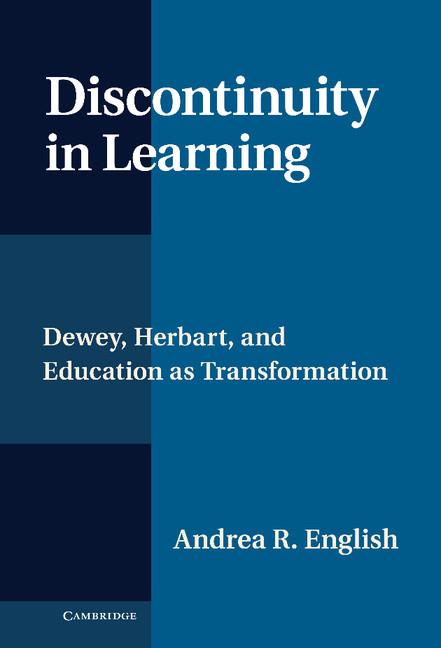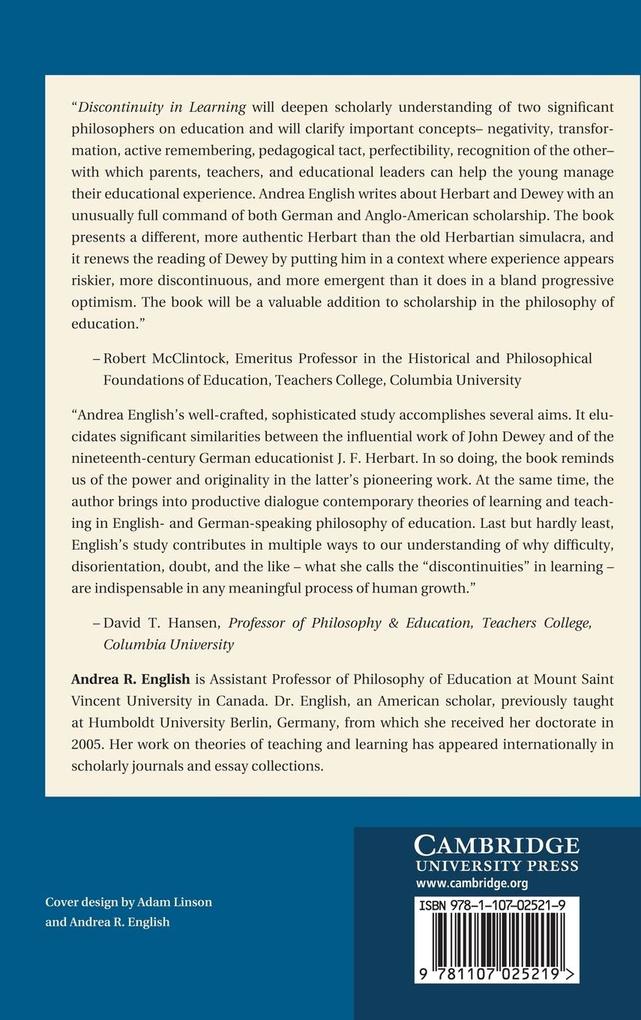
Zustellung: Mi, 13.08. - Sa, 16.08.
Versand in 7 Tagen
VersandkostenfreiBestellen & in Filiale abholen:
In this groundbreaking book, Andrea English challenges common assumptions by arguing that discontinuous experiences, such as uncertainty and struggle, are essential to the learning process. To make this argument, Dr English draws from the works of two seminal thinkers in philosophy of education - nineteenth-century German philosopher J. F. Herbart and American pragmatist John Dewey. English's analysis considers Herbart's influence on Dewey, inverting the accepted interpretation of Dewey's thought as a dramatic break from modern European understandings of education. Three key concepts - transformational learning, tact in teaching, and perfectibility - emerge from this analysis to revitalize our understanding of education as a transformational process. Dr English's comparative approach interweaves European and Anglo-American traditions of educational thought with a contemporary scholarly perspective, contributing to a work that is both intellectually rewarding and applicable to a classroom setting. The result is a book that is essential reading for philosophers and scholars of education, as well as educators.
Inhaltsverzeichnis
Prologue. Why Herbart and Dewey?; Part I. Education, Discontinuity, and Transformation: 1. The moral dimension of education; 2. The problem of continuity, the need for struggle, the role of tact; 3. Discontinuity and educational openings in learning; 4. Teaching in the openings of learning; 5. Conclusion: morality, democracy, and pluralist society; Part II. Teaching and Learning Forgotten?: 6. Revisiting 'learning in-between' and umlernen; 7. Pedagogical tact: learning to teach 'in-between'; 8. Perfectibility and recognition of the other for education; Epilogue. Should teachers think? Re(dis)covering the meaning of philosophy for the education of teachers.
Produktdetails
Erscheinungsdatum
03. März 2014
Sprache
englisch
Untertitel
Dewey, Herbart and Education as Transformation.
Sprache: Englisch.
Seitenanzahl
206
Autor/Autorin
Andrea English
Verlag/Hersteller
Produktart
gebunden
Gewicht
493 g
Größe (L/B/H)
235/157/17 mm
ISBN
9781107025219
Entdecken Sie mehr
Pressestimmen
'This book opens new doors to the understanding of the learning process, shedding unexpected light on J. F. Herbart's influence on John Dewey's work. Dr English enables the reader to make new sense of the importance of uncertainty and struggle in the learning process. Revealing unexpected connections between J. F. Herbart and John Dewey's work, she enhances our understanding of transformation, tact, and perfectibility. Engaging with this text releases the reader's understanding of learning. This text holds great relevance for the active classroom.' Maxine Greene, William F. Russell Professor in the Foundations of Education Emerita, Columbia University 'Discontinuity in Learning will deepen scholarly understanding of two significant philosophers on education and clarify important concepts - negativity, transformation, active remembering, pedagogical tact, perfectibility, recognition of the other, and so on - with which parents, teachers, and educational leaders can help the young manage their educational experience. Andrea English writes about Herbart and Dewey with an unusually full command of both German and Anglo-American scholarship. The book presents a different, more authentic Herbart than the old Herbartian simulacra, and it renews the reading of Dewey by putting him in a context in which experience appears riskier and more discontinuous and emergent than it does in a bland progressive optimism. The book will be a valuable addition to scholarship in the philosophy of education.' Robert McClintock, Emeritus Professor in the Historical and Philosophical Foundations of Education, Columbia University 'Andrea English's well-crafted, sophisticated study accomplishes several valuable aims. It elucidates significant similarities between the influential work on education of John Dewey and of the nineteenth-century German educationist J. F. Herbart. In so doing, the book reminds us of the power and originality in the latter's pioneering work. At the same time, the author brings into productive dialogue contemporary theories of learning and teaching in English- and German-speaking philosophy of education. Last but hardly least, English's study contributes in multiple ways to our understanding of why difficulty, disorientation, doubt, and the like - what she calls the 'discontinuities' in learning - are indispensable in any meaningful process of human growth.' David T. Hansen, Columbia University
Bewertungen
0 Bewertungen
Es wurden noch keine Bewertungen abgegeben. Schreiben Sie die erste Bewertung zu "Discontinuity in Learning" und helfen Sie damit anderen bei der Kaufentscheidung.











